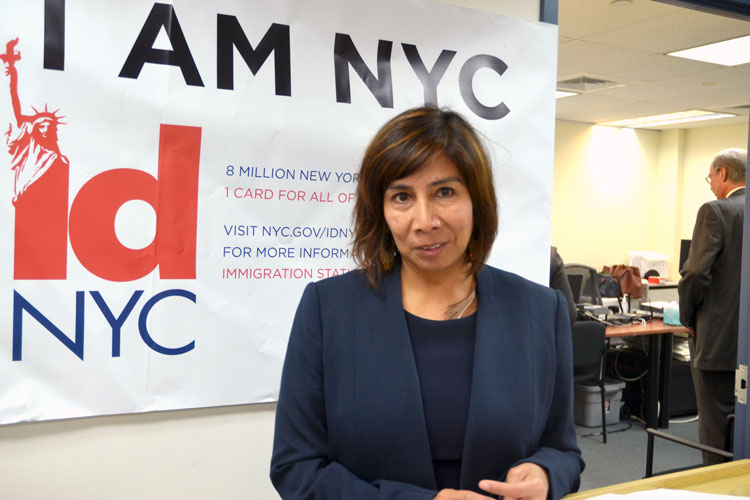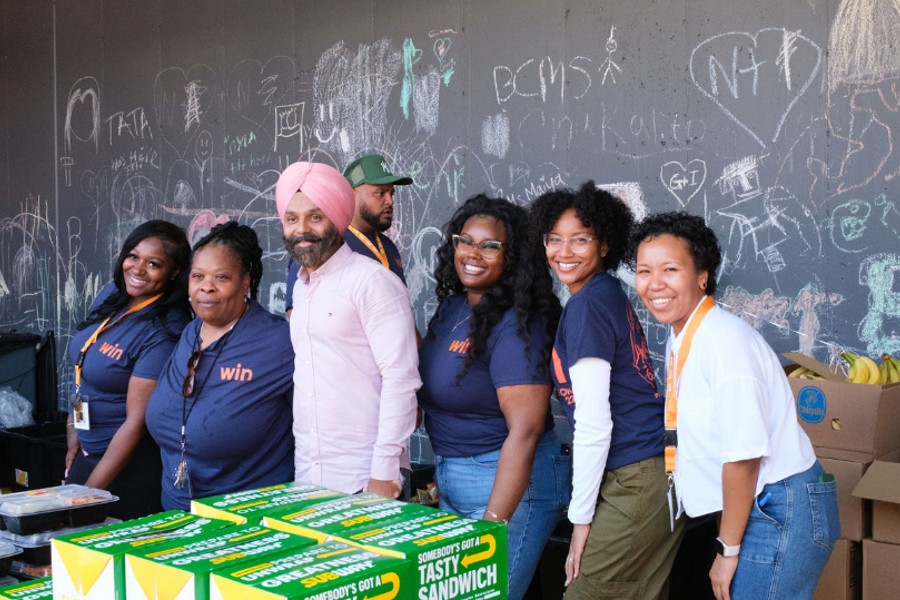 Department of Consumer Affairs (DCA) Commissioner Lorelei Salas (pictured) today announced the Collaborative for Neighborhood Financial Health…an initiative of DCA’s Office of Financial Empowerment (OFE) to work on the community level, in collaboration with residents and community groups, to develop new approaches to empower residents to improve their financial health and stability. DCA OFE will lead teams of community partners in two neighborhoods—Bedford-Stuyvesant and East Harlem—to create a set of indicators to assess neighborhood financial health and then work with the community to develop a set of strategies, policies, programs and financial products that allow neighborhoods to build assets and empower their residents. The project also seeks to advance the understanding of the relationship between an individual’s financial health and the neighborhood in which he or she lives.
Department of Consumer Affairs (DCA) Commissioner Lorelei Salas (pictured) today announced the Collaborative for Neighborhood Financial Health…an initiative of DCA’s Office of Financial Empowerment (OFE) to work on the community level, in collaboration with residents and community groups, to develop new approaches to empower residents to improve their financial health and stability. DCA OFE will lead teams of community partners in two neighborhoods—Bedford-Stuyvesant and East Harlem—to create a set of indicators to assess neighborhood financial health and then work with the community to develop a set of strategies, policies, programs and financial products that allow neighborhoods to build assets and empower their residents. The project also seeks to advance the understanding of the relationship between an individual’s financial health and the neighborhood in which he or she lives.
“We are committed to giving New Yorkers and our neighborhoods the tools they need to thrive and achieve financial stability,” said Mayor Bill de Blasio. “The Collaborative for Neighborhood Financial Health provides another tool the City can use to promote financial empowerment for every New Yorker, regardless of their zip code.”
“Our Financial Empowerment Centers have become a national model for personal financial counseling and have helped more than 40,000 New Yorkers improve their financial health,” said DCA Commissioner Lorelei Salas. “Through this work the Centers continue to identify systematic issues within neighborhoods that are often at the core of an individual’s financial health. We believe, through this process, we have an opportunity to work alongside residents and community groups to meaningfully address these issues.”
Over the next year, the project will answer the following questions:
· How to best measure neighborhood-level financial health?
The Collaborative will develop a set of indicators to identify and measure specific conditions, institutions and practices (both formal and informal) in neighborhoods that support or block residents from building financial health. For example, the number of banks and credit unions that offer safe and affordable financial services and/or misconceptions about banking, the accessibility of food pantries, grocery stores and bodegas that accept Supplemental Nutrition Assistance Program (SNAP) and other benefits, or accessibility to transportation.
· How can government, philanthropy, research and community organizations, financial institutions, and residents collaborate to make changes that impact the financial health of entire neighborhoods?
The Collaborative will create and implement short- and long-term strategies to leverage a neighborhood’s infrastructure to advance neighborhood residents’ economic well-being. This process will be in collaboration with residents, leaders and other stakeholders.
OFE will publish a series of reports that outline the lessons learned from this yearlong project, including strategies to scale and replicate neighborhood-based financial empowerment work across New York City, as well as opportunities for continued work in Bedford-Stuyvesant and East Harlem.
The Collaborative is supported by Citi Foundation in partnership with the Mayor’s Fund to Advance New York City. To lead the initiative DCA OFE and the Mayor’s Fund selected the New Economy Project, a nationally recognized economic justice organization. The New Economy Project team will focus on East Harlem with support from the Lower East Side People’s Federal Credit Union, whose East Harlem Branch is located at Union Settlement Association, and Dr. Hilary Botein, a professor in the School of Public Affairs at Baruch College of the City University of New York. The Bedford-Stuyvesant team is anchored by the Bedford Stuyvesant Restoration Corporation, the nation’s first community development corporation, and supported by Urbane Development, the Local Initiative Support Corporation New York City, and the Center for Financial Services Innovation.
“There is a growing recognition that investing in both people and places is key to improving economic opportunity and mobility,” said Brandee McHale, President of the Citi Foundation. “We believe the data and research generated through this effort will bring new insights into how to support households and whole communities to reach their financial goals and remove the obstacles that stand in the way of economic progress for all.”
“We are proud to continue partnering with DCA OFE to help tens of thousands of families improve their financial stability. Through the Collaborative for Neighborhood Financial Health, we hope to improve the financial well-being of not only our fellow New Yorkers but also our communities as a whole,” said Darren Bloch, Executive Director of the Mayor’s Fund to Advance New York City. “We thank our private partner, the Citi Foundation, and our community-based partners, the New Economy Project and the Bedford Stuyvesant Restoration Corporation, for their support and dedicated engagement with this effort.”
“At the heart of our work for 20 years has been the principle that neighborhoods don’t just happen—they are shaped by public and private institutions, policies, and actions. And neighborhoods often directly influence a person’s economic prospects and financial well-being. We are excited to be leading this project, working closely with East Harlem organizations and residents who can best identify barriers to—and strategies to advance—financial health in their community,” said Deyanira Del Rio, Co-Director of New Economy Project.
“Bedford Stuyvesant Restoration Corporation is pleased to participate in this public-private partnership. DCA OFE and Citi Foundation must be commended for launching this innovative initiative to join with local organizations and community residents to identify and address neighborhood-level, systemic conditions that undermine the financial health of residents. Financial stability is a building block of upward mobility. Understanding and attacking environmental and systemic factors that tilt the playing field against local low and moderate income households is an important step toward the vision of an equitable city,” said Colvin Grannum, President & CEO Bedford-Stuyvesant Restoration Corporation.
“When I became Borough President and saw that tens of thousands of Brooklynites were drowning in debt, I worked with financial institutions, non-profit organizations, and local schools to build a life preserver: free financial literacy programs to improve credit scores, reduce debt, and advance savings for college, retirement, or the purchase of a home,” said Brooklyn Borough President Eric L. Adams. “Financial literacy assists families in developing a monthly budget and building the foundation for a secure future. It is vital that we are able to critically analyze these efforts in communities like Bedford-Stuyvesant, which is why I am confident that the Collaborative for Neighborhood Financial Health will reinforce our efforts to increase financial literacy in Brooklyn.”
“I commend DCA for their focus and investment in East Harlem and I look forward to the production and replication of substantive community-wide initiatives that will empower each and every New Yorker. Prosperity for all is the only path forward.”
“Income inequality is one of the greatest human rights issues of our time and it deserves our unyielding attention and action” said Senator Bill Perkins. “I commend DCA for their focus and investment in East Harlem and I look forward to the production and replication of substantive community-wide initiatives that will empower each and every New Yorker. Prosperity for all is the only path forward.”
The Collaborative for Neighborhood Financial Health program will provide East Harlem residents an opportunity to thrive in this economy. Many thanks to the Department of Consumer Affairs Office of Financial Empowerment for launching this crucial initiative.”
“For years there has been a clear connection between the financial stability of residents and the success of the neighborhood in which they reside,” said Senator José M. Serrano. “I am happy that there is now a program dedicated to pinpointing and implementing the factors that create an economically stable neighborhood by educating and investing in its residents. The Collaborative for Neighborhood Financial Health program will provide East Harlem residents an opportunity to thrive in this economy. Many thanks to the Department of Consumer Affairs Office of Financial Empowerment for launching this crucial initiative.”
“I applaud the New York City Department of Consumer Affairs and Commissioner Lorelei Salas for the launching of the Collaborative for Neighborhood Financial Health initiative,” said Assembly Member Annette M. Robinson. “A successful community is one where the financial health of that community is intact. I appreciative the work done by the local Financial Empowerment Center here in Bedford Stuyvesant. Overall, over 40,000 individuals have received assistance from the Centers Citywide helping to elevate the financial health of individuals and their families. These days, individuals are more conscious of their physical health. We must continue to maintain that type of focus for our financial health.”
“The effort to better understand the financial needs of communities like Bed-Stuy and East Harlem is sorely needed, and I appreciate Mayor de Blasio’s efforts on this critical issue,” said Assembly Member Robert J. Rodriguez. “Studying existing policies and available financial programs is a crucial first step to help ensure that African American and Latino communities increase their access to capital and overall opportunities.”
“When I became Borough President and saw that tens of thousands of Brooklynites were drowning in debt, I worked with financial institutions, non-profit organizations, and local schools to build a life preserver: free financial literacy programs to improve credit scores, reduce debt, and advance savings for college, retirement, or the purchase of a home,” said Brooklyn Borough President Eric L. Adams. “Financial literacy assists families in developing a monthly budget and building the foundation for a secure future. It is vital that we are able to critically analyze these efforts in communities like Bedford-Stuyvesant, which is why I am confident that the Collaborative for Neighborhood Financial Health will reinforce our efforts to increase financial literacy in Brooklyn.”
DCA OFE is the first local government initiative in the country with the specific mission to educate, empower, and protect individuals and families with low incomes, so that they can build assets and make the most of their financial resources. Its hallmark program, the NYC Financial Empowerment Centers, which have been replicated nationally, help clients reduce debt, understand their credit reports, create budgets, improve their credit scores, open bank accounts, and start saving for emergencies and for the future. To date, the Centers have supported more than 37,000 New Yorkers to reduce their debt by $33 million and increase their savings by $3.3 million.
Become a Harlem Insider!
By submitting this form, you are consenting to receive marketing emails from: Harlem World Magazine, 2521 1/2 west 42nd street, Los Angeles, CA, 90008, https://www.harlemworldmagazine.com. You can revoke your consent to receive emails at any time by using the SafeUnsubscribe® link, found at the bottom of every email. Emails are serviced by Constant Contact








